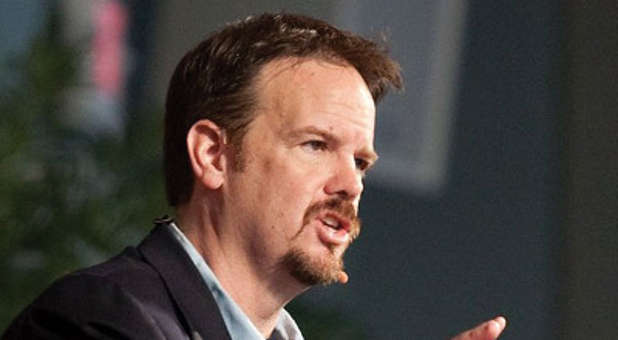
I have a love/hate relationship with leadership.
First of all, I hate it because I'm not a natural born leader. I've never been able to step into leadership roles effortlessly. I meet people who just become leaders because of who they are. I have never been that person.
I was a bookworm and a nerd. Leadership was not something I naturally inherited; it was a skill and a practice I had to learn. And learn I did.
Because of my experience, I think all of us can learn to be leaders. I don't think leadership is simply something we are born with or not. We can learn skills, activities, and practices that help us in the area of leadership.
The difficulty is that leadership has fallen on hard times in evangelical churches. I think part of that is a backlash to what I call the Maxwellization of leadership in the last couple of decades, when John Maxwell's books seemed to be required reading for church leaders. Everything was leadership in the 1980s and 1990s, but now the pendulum has swung the other way. We've moved away from leadership, especially leadership based on business principles. We hear people say, "I don't want to be a CEO leader. I don't want to be dictatorial leaders and hold things over people."
When Mike Dodson and I were researching and writing Comeback Churches, we may have gotten caught up in that backlash. We wanted to find what factors led to church revitalization. We expected to find prayer, preaching, evangelism, etc. We researched and we studied more than 320 churches. We called them and did multiple interviews with dozens of them. Do you know what we found? Everything rises and falls on leadership.
We were focused on prayer, preaching, structure, evangelism and ministry, but we found leaders led churches to engage in those areas. In his essay on Paul's leadership development for the book Paul's Missionary Methods, Chuck Lawless writes:
"I have served as a church consultant for more than fifteen years. The work has been steady, as few churches on the North American continent (or around the world, for that matter) are fully healthy. The weaknesses in most churches are several, including a lack of evangelism, a failure to disciple, a focus turned inward and a myriad of other issues. At the core of most concerns, however, is a singular pressing issue: a failure in leadership."
And, by the way, though I was concerned about the Maxwellization of leadership, the number one author credited and cited by those who led church revitalizations was John Maxwell.
Scripture is unapologetic in holding up the value and the example of leadership. We need to be clear about the biblical teaching that leadership matters. Leadership matters to God. God chooses and uses leaders. Leadership matters to churches. God uses leaders within churches to lead people to that which he desires them to engage.
The lack of leadership development is, in my view, one of the primary reasons churches plateau. Too many pastors are incapable (or unwilling) to identify and cultivate leaders within the church. They struggle mightily just to recruit workers! But, until pastors are able and willing to train leaders and leaders of leaders, the church will always stop growing at the furthest reaches of the pastor's own ability to work.
We know the names of great leaders of God's people and why they matter. We know what they did. Leadership is not just a biblical concept in the church, but it's a godly practice shown throughout Scripture. It is both prescribed (it's a noble task, it needs to be done, raise up leaders), and described (stories of how leaders have functioned well and poorly). Leadership is both a biblical practice and biblical principle.
Many of us need to get beyond the pendulum swing and to think more biblically and more discerningly about the issue of leadership. Obviously, there are extremes and reaching for a counter-extreme is not good.
But, we should carefully consider the widely quoted statement: "Everything rises and falls on leadership." Everything is not about leadership, but we must recognize leadership impacts every other area.![]()
Ed Stetzer is the executive producer of LifeWay Research. For the original article, visit edstetzer.com.
Get Spirit-filled content delivered right to your inbox! Click here to subscribe to our newsletter.
Dr. Steve Greene is now sharing stories, teachings, and conversations with guests who lead with love on Love Leads, a new podcast. Listen now.
Dr. Mark Rutland's
National Institute of Christian Leadership (NICL)
The NICL is one of the top leadership training programs in the U.S. taught by Dr. Mark Rutland. If you're the type of leader that likes to have total control over every aspect of your ministry and your future success, the NICL is right for you!
FREE NICL MINI-COURSE - Enroll for 3-hours of training from Dr. Rutland's full leadership course. Experience the NICL and decide if this training is right for you and your team.
Do you feel stuck? Do you feel like you’re not growing? Do you need help from an expert in leadership? There is no other leadership training like the NICL. Gain the leadership skills and confidence you need to lead your church, business or ministry. Get ready to accomplish all of your God-given dreams. CLICK HERE for NICL training dates and details.The NICL Online is an option for any leader with time or schedule constraints. It's also for leaders who want to expedite their training to receive advanced standing for Master Level credit hours. Work through Dr. Rutland's full training from the comfort of your home or ministry at your pace. Learn more about NICL Online. Learn more about NICL Online.


